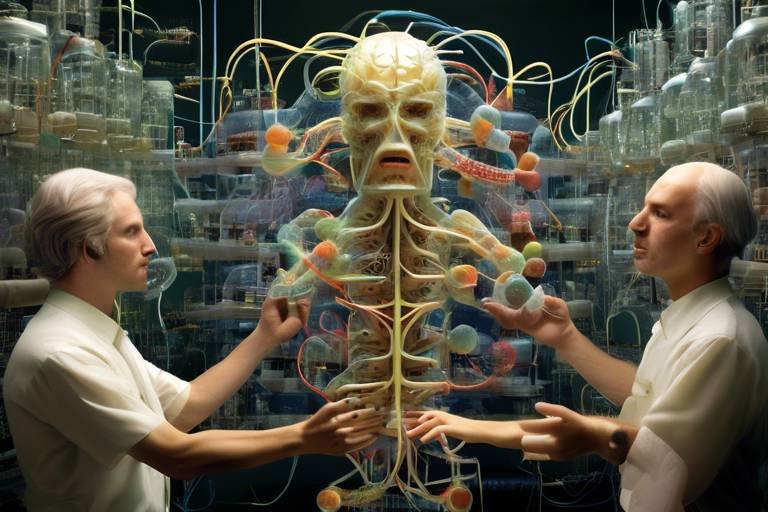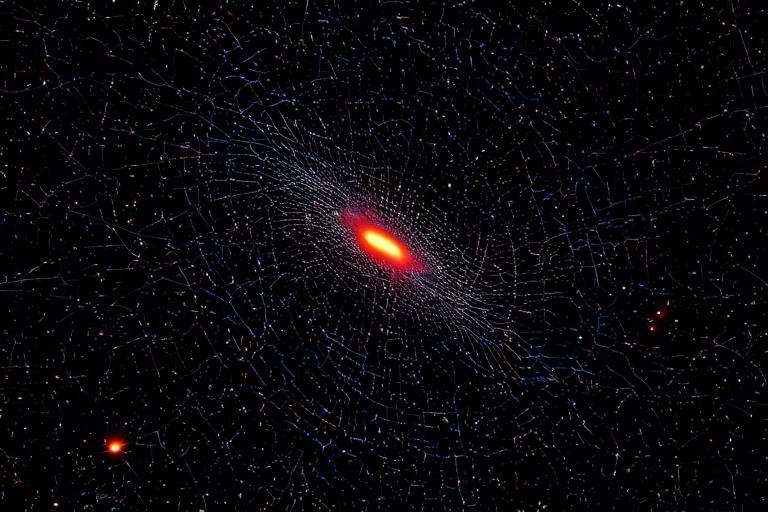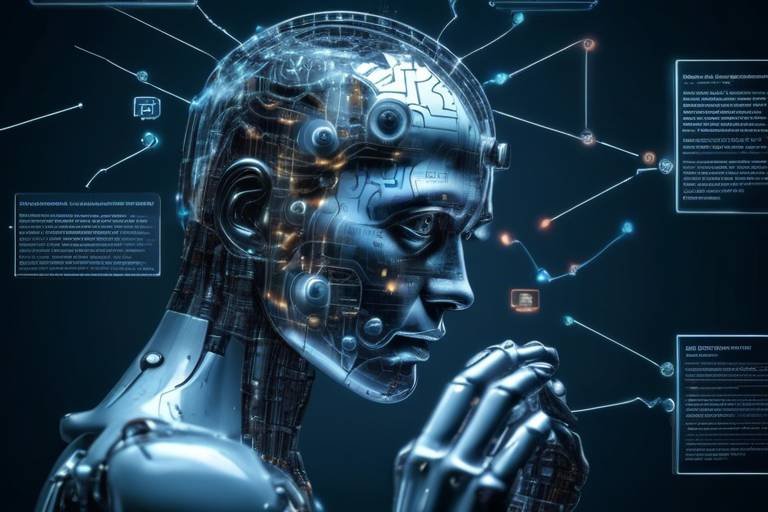The Philosophy in Cognitive Sciences - Is the Mind a Machine?
The age-old question of whether the mind can be understood as a machine has intrigued philosophers, scientists, and curious minds alike. As we delve into the realm of cognitive sciences, we find ourselves at a fascinating intersection where philosophy and science collide. Imagine the mind as a complex, intricate machine, operating with precision and efficiency. But what does that really mean for our understanding of consciousness and intelligence? Is our thought process merely a series of mechanical operations, or is there something more profound at play? This article aims to explore these tantalizing questions, shedding light on the implications of viewing the mind through a mechanical lens.
Understanding consciousness is fundamental to cognitive science. It’s like trying to catch a shadow; the more you chase it, the more elusive it becomes. Various philosophical perspectives have emerged over time, each attempting to unravel the mystery of consciousness. Some argue that consciousness is an emergent property of complex systems, while others believe it’s an intrinsic aspect of our being. The concept of the mind as a machine suggests that our mental processes could be broken down into mechanical functions—a series of inputs, processes, and outputs. This perspective invites us to reconsider what it means to be aware and to think. Can we truly reduce our rich tapestry of thoughts, emotions, and experiences to mere mechanical functions?
To appreciate the current discourse on the mind and machine, we must first journey through history. The evolution of thought regarding the mind has been shaped by several key figures, each contributing to a broader understanding. From ancient philosophers to contemporary scientists, the dialogue has shifted dramatically. Notable philosophers like Aristotle and Immanuel Kant laid the groundwork for our understanding of cognition, while modern thinkers have expanded these ideas in light of advancements in neuroscience.
At the heart of the debate is the contrast between dualism and physicalism. Dualism, famously championed by René Descartes, posits a separation between the mind and body, suggesting that mental phenomena are non-physical. On the other hand, physicalism argues for a unified understanding, asserting that everything about the mind can be explained through physical processes. This fundamental divide raises crucial questions about the nature of consciousness and its relationship to the brain.
Descartes' dualistic approach has significantly influenced philosophical thought about the mind. His assertion, "I think, therefore I am," encapsulates the essence of human consciousness as something distinct from the physical body. This perspective laid the groundwork for centuries of debate about the nature of existence and the relationship between mind and matter. As we navigate through cognitive science today, Descartes' legacy continues to provoke thought and inspire inquiry into the depths of our consciousness.
In contrast, modern physicalism offers a framework for understanding the mind as a product of physical processes. This view aligns with advancements in neuroscience, where brain imaging and cognitive research have unveiled the intricacies of mental functions. The idea that our thoughts, emotions, and consciousness emerge from neural activities challenges the dualistic paradigm, suggesting that perhaps the mind is more akin to a sophisticated machine than previously thought. As we unravel the complexities of the brain, we inch closer to answering the question: can the mind truly be equated with a machine?
The computational theory of mind posits that cognitive processes can be understood as computational operations. Think of it as a computer processing data; inputs are received, processed, and outputs are generated. This theory has significant implications for our understanding of intelligence and consciousness. If our mental processes can be reduced to algorithms and computations, what does that say about our unique human experience? Are we, in essence, just highly advanced biological machines?
As we venture into the realm of artificial intelligence (AI), the relationship between AI and cognitive science becomes increasingly complex. Can machines truly replicate human thought and consciousness? While AI has made remarkable strides in mimicking human behavior, the question remains: can a machine ever truly understand or feel? The philosophical implications of creating intelligent machines challenge our traditional notions of consciousness and what it means to be "alive."
With the advancement of AI technology, ethical questions arise regarding the treatment of machines and the nature of consciousness. Are we prepared to grant rights to machines that exhibit signs of intelligence? As we create more sophisticated AI, we must grapple with the moral implications of our creations. This discussion is not merely academic; it has real-world consequences that could shape the future of our society.
Looking ahead, the future of cognitive science and philosophy is ripe with possibilities. Emerging technologies, such as neurotechnology and AI, may reshape our understanding of the mind-machine relationship. As we continue to explore the depths of consciousness, we may find ourselves redefining what it means to be human. The intersection of philosophy and cognitive science will undoubtedly pave the way for groundbreaking discoveries that challenge our perceptions and beliefs.
- Can the mind really be equated with a machine?
While many argue that cognitive processes can be understood mechanically, the essence of consciousness remains a profound mystery. - What are the ethical implications of AI?
As AI technology advances, we must consider the moral responsibilities we have towards intelligent machines. - How does modern neuroscience relate to philosophy?
Modern neuroscience provides empirical evidence that influences philosophical debates about the nature of the mind and consciousness.

The Nature of Consciousness
Understanding consciousness is fundamental to cognitive science. It's like trying to catch smoke with your bare hands; the more you grasp, the more elusive it becomes. Philosophers and scientists have long debated what consciousness truly is and how it can be defined. Some argue that consciousness is simply a byproduct of complex brain processes, while others believe it transcends mere biology, hinting at something more profound. This duality raises a compelling question: Can the mind be reduced to mere mechanical operations?
At the heart of this inquiry lies the challenge of defining consciousness itself. Is it merely awareness, or does it encompass a deeper sense of self? Some perspectives suggest that consciousness involves a rich tapestry woven from sensory experiences, emotions, and thoughts. To illustrate this, consider the following aspects that contribute to our understanding of consciousness:
- Subjective Experience: Each person's consciousness is unique, shaped by individual experiences and perceptions.
- Intentionality: Consciousness often involves being directed towards something, whether it be an object, thought, or feeling.
- Qualia: These are the individual instances of subjective, conscious experience, such as the redness of red or the bitterness of coffee.
Philosophers like David Chalmers have famously articulated the "hard problem" of consciousness, which questions why and how physical processes in the brain give rise to the subjective experience of being. This leads us to ponder whether our minds function more like sophisticated machines or whether they possess some elusive quality that machines cannot replicate. The debate continues to evolve, intertwining with advancements in neuroscience, which strive to map the brain's workings and correlate them with conscious experience.
As we delve deeper into the nature of consciousness, it becomes clear that understanding it requires an interdisciplinary approach. Cognitive science, philosophy, neuroscience, and even psychology play pivotal roles in piecing together this intricate puzzle. Each field offers unique insights, yet they often converge on a singular realization: consciousness is not just about computation or mechanical processes; it embodies a rich, subjective experience that is profoundly human.
In essence, while the mind may exhibit machine-like qualities, it also embodies an intricate complexity that challenges our understanding. As we continue to explore this fascinating intersection of philosophy and cognitive science, we must remain open to the possibility that consciousness may never be fully understood as a mere machine. Instead, it might be a unique phenomenon that blends the biological with the philosophical, urging us to rethink what it means to be conscious.

Historical Context
The exploration of the relationship between the mind and machine has a rich and intricate history that spans centuries. This journey begins in ancient philosophy, where thinkers like Socrates and Plato laid the groundwork for understanding human thought and existence. They pondered questions about the essence of reality and the nature of knowledge, setting the stage for later discussions about the mind’s capabilities. Fast forward to the 17th century, and we encounter René Descartes, a pivotal figure whose dualistic perspective suggested a clear distinction between the mind and the body. Descartes famously declared, “Cogito, ergo sum” — “I think, therefore I am” — emphasizing the importance of thought as a defining characteristic of human existence.
As the centuries progressed, the Enlightenment era brought about a surge of interest in understanding the mind through a more scientific lens. Thinkers such as David Hume and Immanuel Kant began to explore the mechanisms of human cognition, questioning how knowledge is acquired and processed. The advent of the industrial revolution further influenced this discourse, as machines became more prevalent in society, prompting philosophers and scientists alike to draw parallels between human thought processes and mechanical operations.
The 20th century marked a significant turning point in the historical context of cognitive science. With the emergence of behaviorism, the focus shifted away from introspection and consciousness toward observable behaviors. However, this approach was soon challenged by the cognitive revolution, which reintroduced the importance of mental processes. The work of pioneers like Noam Chomsky highlighted the complexity of language and cognition, suggesting that the mind operates in ways that can be likened to computational processes.
Throughout this historical journey, two primary philosophical perspectives have emerged: dualism and physicalism. Dualism posits that the mind and body are fundamentally different, while physicalism argues for a unified understanding, asserting that mental states are entirely the result of physical processes. This ongoing debate has profound implications for cognitive science, shaping how researchers approach the study of the mind and its relationship with machines.
| Philosopher | Key Contribution | Era |
|---|---|---|
| René Descartes | Introduced dualism; emphasized the distinction between mind and body. | 17th Century |
| David Hume | Examined human cognition and the nature of knowledge. | 18th Century |
| Noam Chomsky | Challenged behaviorism; emphasized the complexity of language and cognition. | 20th Century |
As we delve deeper into the interplay between cognitive science and philosophy, it becomes clear that understanding the historical context is crucial. The ideas and debates that have shaped our understanding of the mind continue to influence contemporary discussions about artificial intelligence and the nature of consciousness. The question remains: can we truly grasp the essence of the mind through the lens of machinery, or is there something inherently unique about human thought that defies mechanistic explanations?
- What is the difference between dualism and physicalism?
Dualism posits that the mind and body are separate entities, while physicalism argues that mental states are entirely physical processes. - How did the cognitive revolution change the study of the mind?
The cognitive revolution shifted focus back to mental processes, emphasizing the importance of understanding cognition, rather than just observable behavior. - Who are some key figures in the history of cognitive science?
Notable figures include René Descartes, David Hume, and Noam Chomsky, each contributing significantly to our understanding of the mind.

Dualism vs. Physicalism
The debate between dualism and physicalism is one of the most captivating discussions in the realm of cognitive science and philosophy. At its core, dualism posits that the mind and body are fundamentally different substances. This perspective suggests that our mental states—thoughts, feelings, and consciousness—exist separately from our physical bodies. On the other hand, physicalism argues that everything about the mind can be explained through physical processes, implying that mental states are ultimately reducible to brain states. This dichotomy raises essential questions: Can we truly separate the mind from the body, or are they two sides of the same coin?
To better understand these two perspectives, let's delve into their implications for cognitive science:
| Aspect | Dualism | Physicalism |
|---|---|---|
| Nature of Mind | Separate from the body | Part of physical processes |
| Consciousness | Non-physical entity | Emerges from brain activity |
| Implications for AI | Machines cannot replicate true consciousness | Possibility of machine consciousness |
One of the most well-known proponents of dualism was René Descartes, who famously declared, "I think, therefore I am." Descartes argued that the mind is a non-material entity that interacts with the body but exists independently of it. This perspective has had a lasting impact on how we perceive consciousness and identity. However, critics of dualism point out that it struggles to explain how two distinct substances can interact. If the mind is non-physical, how does it influence our physical actions? This question has led many to favor physicalism, which provides a more straightforward framework for understanding the mind as a product of brain activity.
Modern physicalism has gained traction, especially with advancements in neuroscience. Researchers have discovered numerous connections between brain activity and mental states, suggesting that our thoughts and emotions are not merely abstract concepts but are rooted in the physical workings of our brains. This perspective aligns with the scientific method, prioritizing observable phenomena over metaphysical speculation. However, the challenge remains: can physicalism fully account for the rich, subjective experience of consciousness? Or does it risk oversimplifying the complexities of human thought and emotion?
In conclusion, the dualism vs. physicalism debate is not just an academic exercise; it has profound implications for our understanding of consciousness, identity, and what it means to be human. As cognitive science continues to evolve, finding a middle ground between these two perspectives might be key to unlocking the mysteries of the mind.
- What is dualism? Dualism is the philosophical position that the mind and body are distinct and separate entities.
- What is physicalism? Physicalism is the view that everything about the mind can be explained through physical processes and that mental states are reducible to brain states.
- Who is René Descartes? René Descartes was a French philosopher and mathematician known for his dualistic approach to understanding the mind and body.
- Can machines possess consciousness? This is a contentious issue, with physicalists suggesting that it may be possible, while dualists argue that true consciousness cannot be replicated by machines.

René Descartes' Influence
René Descartes, often hailed as the father of modern philosophy, profoundly influenced our understanding of the mind and its relationship to the body. His famous dictum, "Cogito, ergo sum" (I think, therefore I am), emphasizes the importance of thought as the foundation of existence. Descartes proposed a dualistic view, asserting that the mind and body are distinct entities. This separation raises intriguing questions about the nature of consciousness and how it relates to cognitive processes.
Descartes believed that the mind, a non-physical entity, interacts with the body, a physical one, through the pineal gland. This idea suggests that while our thoughts and consciousness are separate from our physical form, they still influence our actions and experiences. His perspective has led to ongoing debates within cognitive science about whether consciousness can be fully understood through a physical lens or if there are elements that remain elusive and beyond empirical investigation.
One of the key implications of Descartes' dualism is the challenge it poses to the scientific study of the mind. If the mind operates independently of the body, how can we measure or assess cognitive functions? This question has fueled various philosophical inquiries and scientific explorations, leading to the development of different theories about consciousness and cognition. In fact, many contemporary discussions in cognitive science can trace their roots back to Descartes' foundational ideas.
To illustrate the impact of Descartes' thoughts, consider the following points:
- Mind-Body Interaction: Descartes' assertion that the mind influences the body has paved the way for exploring how emotions and thoughts can affect physical health.
- Scientific Inquiry: His dualism has sparked debates about the limitations of scientific methods in understanding consciousness.
- Philosophical Frameworks: Many modern philosophical frameworks, including existentialism and phenomenology, build upon or react against Descartes' ideas.
In summary, René Descartes' influence on cognitive science is undeniable. His exploration of the mind-body problem continues to shape philosophical discourse and scientific inquiry today. As we delve deeper into the complexities of consciousness and intelligence, Descartes' legacy serves as a reminder of the intricate relationship between our thoughts and our physical existence.

Modern Physicalism
Modern physicalism represents a significant leap in our understanding of the mind, aligning closely with advancements in neuroscience and cognitive research. At its core, this philosophical stance posits that everything about the mind can be explained in terms of physical processes, essentially arguing that our thoughts, emotions, and consciousness are products of brain activity. This notion challenges the traditional dualistic perspective that separates the mind from the body, suggesting instead that the mind is not some ethereal entity, but rather an intricate machine fueled by biochemical reactions and neural networks.
One of the most compelling aspects of modern physicalism is its ability to integrate findings from various scientific disciplines. For instance, cognitive science, psychology, and biology converge to provide a holistic view of how mental states arise from physical states. This interdisciplinary approach allows researchers to explore questions like, "How do neurons firing in the brain translate to the experience of joy or sadness?" and "Can we pinpoint the exact moment a thought occurs?" The implications of such inquiries are profound, as they open up pathways to potentially understanding not just human cognition, but also the very essence of consciousness itself.
Moreover, modern physicalism is bolstered by technological advancements such as brain imaging techniques, which allow scientists to observe brain activity in real-time. These tools provide a window into the workings of the mind, revealing how specific regions of the brain correlate with particular thoughts or actions. For example, studies have shown that when a person feels happy, certain areas of the brain, like the prefrontal cortex, exhibit increased activity. This kind of evidence supports the physicalist view that mental states are deeply rooted in our biological makeup.
However, while modern physicalism offers a robust framework for understanding the mind, it also raises critical questions. Can the richness of human experience, with its complexities and nuances, truly be reduced to mere physical interactions? This debate often leads to discussions about the limitations of a purely physicalist approach. Critics argue that by focusing solely on the physical, we might overlook essential aspects of human experience, such as subjective feelings and the qualitative nature of consciousness.
To illustrate the contrasts and connections between physicalism and dualism, consider the following table:
| Aspect | Dualism | Modern Physicalism |
|---|---|---|
| Mind-Body Relationship | Separate entities | Unified entity |
| Nature of Consciousness | Non-physical | Physical process |
| Scientific Support | Limited | Strong |
| Implications for AI | Potential for true consciousness | Complex programming and simulation |
In conclusion, modern physicalism not only reshapes our understanding of the mind but also challenges us to consider the implications of viewing consciousness as a product of physical processes. As we continue to explore the depths of cognitive science, the dialogue between physicalism and other philosophical perspectives will likely evolve, paving the way for new insights into the enigmatic nature of the mind.

Computational Theory of Mind
The (CTM) is a fascinating concept that positions cognitive processes as akin to computational operations. Imagine your mind as a complex computer, processing information, running algorithms, and producing outputs based on inputs. This analogy is not just a metaphor; it reflects a profound shift in how we understand intelligence and consciousness. But what does it really mean to say that our minds operate like machines? Let's dive deeper!
At its core, CTM suggests that thinking is a form of computation. Just as a computer takes data, processes it, and produces results, our brains receive sensory inputs, manipulate that information, and generate thoughts, decisions, and actions. This perspective raises intriguing questions about the nature of consciousness. If our minds are indeed machines, can we replicate human thought in artificial systems? And if so, what does that say about the uniqueness of human consciousness?
To elaborate on this theory, consider the following key components:
- Information Processing: Our brains process information in a manner similar to how computers handle data. This includes encoding, storing, and retrieving information.
- Symbol Manipulation: Just as a computer manipulates symbols to perform tasks, our minds manipulate symbols (like language and concepts) to navigate the world.
- Algorithms: Cognitive functions can be viewed as algorithms—sets of rules or instructions that our minds follow to solve problems and make decisions.
One of the most compelling implications of the Computational Theory of Mind is its potential to bridge the gap between human cognition and artificial intelligence. If we can understand the algorithms that underlie human thought, we might be able to program machines to think like us. However, this raises ethical questions: if we create machines that can think and feel, what rights do they have? Are they merely tools, or do they deserve a place in our moral framework?
Moreover, the CTM invites us to reconsider our definitions of intelligence and consciousness. Are these qualities exclusive to biological organisms, or can they emerge in non-biological systems as well? The answers to these questions could redefine our understanding of what it means to be "alive" or "aware."
As we explore the implications of the Computational Theory of Mind, it becomes clear that this framework not only enhances our understanding of cognitive processes but also challenges our perceptions of identity, intelligence, and morality in an increasingly digital world. The journey of unraveling the mysteries of the mind continues, and with it, the potential for groundbreaking advancements in both cognitive science and artificial intelligence.
What is the Computational Theory of Mind?
The Computational Theory of Mind posits that cognitive processes can be understood as computational operations, similar to how computers process data.
Can machines truly replicate human thought?
While machines can mimic certain aspects of human thought through algorithms, whether they can replicate the full depth of human consciousness remains a topic of debate.
What are the ethical implications of AI?
As AI technology advances, ethical questions arise regarding the treatment of intelligent machines and whether they deserve rights similar to humans.

Artificial Intelligence and the Mind
Artificial Intelligence (AI) has become a buzzword in today's tech-driven world, but what does it really mean for our understanding of the mind? The intersection of AI and cognitive science raises profound questions about the nature of thought, consciousness, and what it truly means to be intelligent. Can machines think like humans? Are they capable of experiencing emotions, or is their "intelligence" merely a sophisticated mimicry of human behavior? These questions not only challenge our definitions of intelligence but also invite us to reconsider the very fabric of consciousness itself.
To grasp the relationship between AI and the mind, we need to explore the underlying principles that guide both. At its core, AI operates on algorithms and data, processing information in ways that can sometimes appear remarkably human-like. However, unlike the human mind, which is influenced by emotions, experiences, and a myriad of complex biological processes, AI lacks genuine understanding and awareness. It’s like comparing a well-trained parrot to a human being; while the parrot can mimic speech, it doesn’t truly comprehend what it’s saying. This distinction is crucial as we navigate the realm of artificial intelligence.
As we delve deeper, we encounter the concept of machine learning, a subset of AI that allows systems to learn from data and improve over time. This technology raises the question: if machines can learn, can they also possess a form of consciousness? Some argue that consciousness is not merely a byproduct of biological processes but a functional characteristic that could, in theory, be replicated in machines. Others vehemently disagree, positing that consciousness is inherently tied to our biological nature and experiences.
Furthermore, the implications of AI extend beyond mere intellectual capabilities. Consider the emotional aspect of intelligence. Can an AI truly empathize with a human being? While machines can be programmed to recognize emotional cues and respond accordingly, the lack of genuine emotional experience means their responses may lack authenticity. This leads us to ponder the ethical ramifications of creating machines that can simulate human emotions. Should we treat these machines as sentient beings, or are they simply sophisticated tools designed to serve our needs?
As AI technology continues to advance, we must also confront the ethical dilemmas that arise. For instance, if we create machines that can mimic human thought and emotion, what rights do they hold? Should we grant them the same moral considerations as living beings? These questions are not just philosophical musings; they have real-world implications that could reshape our societal norms and legal frameworks.
In conclusion, the exploration of artificial intelligence in relation to the mind is a fascinating journey that challenges our understanding of consciousness, intelligence, and ethics. As we stand on the brink of a new era in cognitive science, it is essential to engage in these discussions, ensuring that we navigate the complexities of AI with both caution and curiosity.
- Can AI truly think like a human? No, AI can simulate thought processes but lacks genuine understanding and consciousness.
- What is machine learning? Machine learning is a subset of AI that allows systems to learn from data and improve over time.
- Are AI systems capable of emotions? While AI can mimic emotional responses, they do not possess true emotions or consciousness.
- What ethical concerns arise with AI? Ethical concerns include the treatment of AI as sentient beings and the potential consequences of their decisions.

Ethical Considerations
As we stand on the brink of a technological revolution, the rise of artificial intelligence (AI) compels us to confront a myriad of ethical questions that challenge our understanding of consciousness, intelligence, and the very fabric of what it means to be human. Are we playing God by creating machines that can think, learn, and perhaps even feel? This is not merely a philosophical musing; it’s a pressing concern that has implications for society, law, and morality.
One of the most significant ethical dilemmas revolves around the treatment of intelligent machines. If we design AI systems that exhibit behaviors akin to human thought and emotion, should we grant them certain rights? For instance, consider the implications if an AI could express desires or preferences. Would it be ethical to turn it off or reprogram it against its will? This question leads us to ponder the essence of consciousness itself: is it merely a byproduct of complex computations, or does it require a biological substrate?
Moreover, the potential for AI to surpass human intelligence raises concerns about the balance of power. If machines become capable of making decisions that affect human lives—such as in healthcare, law enforcement, or even warfare—who is held accountable for their actions? The concept of machine autonomy invites scrutiny over the moral responsibilities of creators versus the actions of their creations. This is where the lines between human and machine blur, creating a landscape fraught with ethical ambiguity.
In addition to these philosophical quandaries, practical ethical considerations emerge regarding bias in AI systems. Algorithms are designed by humans, and thus they can inherit human biases, leading to discriminatory outcomes. For example, if an AI system used in hiring processes is trained on historical data that reflects societal biases, it may perpetuate those biases, leading to unfair treatment of candidates from certain demographics. This raises the question: how do we ensure that AI systems are fair and just?
To navigate these complex issues, it is essential to establish ethical frameworks that guide the development and deployment of AI technologies. A collaborative approach involving ethicists, scientists, policymakers, and the public can foster a more equitable and responsible integration of AI into society. Here are some key ethical considerations that should be addressed:
- Transparency: AI systems should be transparent in their decision-making processes to allow for accountability.
- Fairness: Measures should be taken to mitigate bias and ensure equitable treatment across all demographics.
- Safety: AI should be designed to prioritize human safety and avoid harm.
- Rights: As AI systems evolve, discussions about their rights and the moral implications of their treatment should be ongoing.
Ultimately, the ethical considerations surrounding AI and cognitive science are not just about technology; they reflect our values as a society. Are we willing to embrace the responsibility that comes with creating intelligent systems? The answers to these questions will shape the future of cognitive science and our relationship with machines.
- What is the main ethical concern regarding AI? The primary concern is how to treat intelligent machines and whether they should have rights similar to humans.
- How can we ensure AI systems are fair? By implementing practices that mitigate bias during the design and training of AI algorithms.
- What role do ethicists play in AI development? Ethicists help guide the moral implications of AI technologies and ensure that ethical frameworks are established.
- Can AI truly replicate human consciousness? This remains a debated topic, as consciousness is still not fully understood, even in humans.

The Future of Cognitive Science
The future of cognitive science is as thrilling as it is uncertain. As we stand on the brink of a new era, the intersection of neuroscience, artificial intelligence, and philosophy is set to redefine our understanding of the mind. Imagine a world where the boundaries between human cognition and machine intelligence blur, leading us to profound questions about what it means to be conscious. Will we find ourselves in a reality where machines not only mimic our thought processes but also possess a form of consciousness? This tantalizing possibility compels us to explore the implications of emerging technologies on cognitive science.
One of the most exciting prospects is the advancement of neurotechnology, which could allow us to interface directly with the brain. Technologies such as brain-computer interfaces (BCIs) hold the potential to enhance cognitive abilities, treat neurological disorders, and even reshape our understanding of memory and learning. Picture being able to download information directly into your brain or communicate with others through thought alone. While this may sound like science fiction, researchers are making strides that could bring these ideas closer to reality.
Moreover, the rise of artificial general intelligence (AGI) poses intriguing questions. AGI, unlike current AI systems that specialize in narrow tasks, aims to replicate human-like reasoning and problem-solving abilities across a broad range of domains. This raises ethical considerations about the rights of such entities and the nature of their consciousness. Are we prepared to treat machines with advanced cognitive abilities as sentient beings? The answers to these questions could shape not only the future of cognitive science but also the moral landscape of our society.
As we delve into the future, interdisciplinary collaboration will be crucial. Cognitive science will increasingly draw from fields such as psychology, computer science, linguistics, and even philosophy. This amalgamation of perspectives will foster a more comprehensive understanding of the mind. For instance, the integration of machine learning techniques with cognitive theories could lead to breakthroughs in how we model human thought processes. Imagine algorithms that not only replicate human decision-making but also provide insights into the underlying mechanisms of our thoughts.
To navigate this evolving landscape, researchers and ethicists alike must engage in ongoing dialogue. The implications of these advancements are vast and complex. We must consider questions such as:
- How will the definition of consciousness evolve as we create more sophisticated AI?
- What ethical frameworks should govern the development and deployment of intelligent machines?
- How can we ensure that technological advancements benefit all of humanity, rather than exacerbate existing inequalities?
In conclusion, the future of cognitive science is poised for exciting developments that challenge our understanding of the mind and consciousness. As we explore these frontiers, it is essential to remain vigilant and thoughtful about the ethical implications of our discoveries. The journey ahead promises to be as enlightening as it is complex, paving the way for a deeper understanding of what it means to think, feel, and be.
- What is cognitive science? Cognitive science is an interdisciplinary field that studies the mind and its processes, including how people think, learn, and remember.
- How does artificial intelligence relate to cognitive science? AI aims to replicate human-like cognitive functions, making it a key area of study within cognitive science.
- What ethical concerns arise with advancements in cognitive science? Ethical concerns include the treatment of intelligent machines, privacy issues related to neurotechnology, and the potential for inequality in access to cognitive enhancements.
- Will machines ever have consciousness? This remains a debated topic; while machines can simulate cognitive processes, whether they can truly possess consciousness is still uncertain.
Frequently Asked Questions
- What is the main idea behind the philosophy in cognitive sciences?
The main idea revolves around understanding whether the mind can be viewed as a machine. This perspective raises questions about consciousness, intelligence, and the nature of human thought, prompting deep philosophical discussions.
- How does consciousness relate to cognitive science?
Consciousness is a central theme in cognitive science. It explores various philosophical perspectives and theories that attempt to explain how our awareness and experiences can be understood through cognitive processes.
- What is the difference between dualism and physicalism?
Dualism posits that the mind and body are separate entities, while physicalism argues that everything, including the mind, is a product of physical processes. This debate has significant implications for our understanding of consciousness and cognitive science.
- Who is René Descartes and what is his contribution to this field?
René Descartes was a philosopher who famously argued for dualism, suggesting a clear distinction between mind and body. His ideas have profoundly influenced modern philosophy and cognitive science, sparking ongoing discussions about the nature of consciousness.
- What does modern physicalism suggest about the mind?
Modern physicalism suggests that the mind arises from physical processes in the brain. This perspective aligns with advancements in neuroscience, which seek to explain cognitive functions through biological mechanisms.
- What is the computational theory of mind?
The computational theory of mind posits that cognitive processes can be understood as computational operations. This theory has significant implications for how we view intelligence and consciousness in both humans and machines.
- Can artificial intelligence replicate human thought?
This question is hotly debated. While AI can simulate certain aspects of human thought, many argue that it lacks genuine consciousness and understanding, raising ethical and philosophical concerns about the nature of intelligence.
- What are the ethical considerations surrounding AI?
As AI technology advances, ethical questions arise regarding the treatment of intelligent machines and their rights. This includes discussions about the moral implications of creating entities that may possess some form of consciousness.
- What does the future hold for cognitive science?
The future of cognitive science is likely to be shaped by emerging technologies that could redefine our understanding of the relationship between mind and machine. This includes advancements in AI, neuroscience, and philosophical inquiry.



















